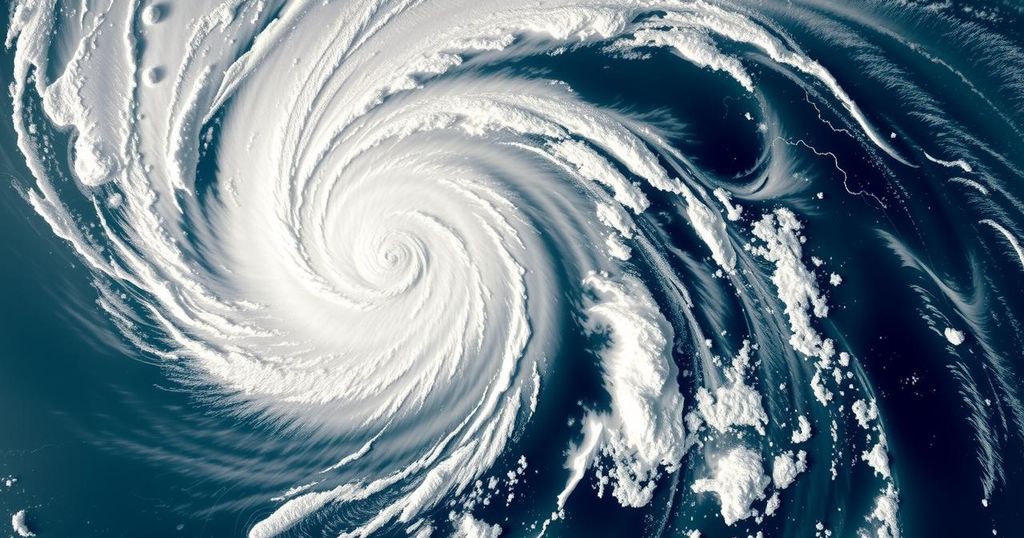Cyclone Chido Causes Severe Damage in Mayotte as It Approaches Eastern Africa
Tropical Cyclone Chido struck Mayotte, causing severe damage with winds exceeding 220 km/h, while moving toward eastern Africa. Mayotte Prefect Francois-Xavier Bieuville noted it as the most destructive cyclone since 1934. The cyclone has also threatened Mozambique, where millions could be affected, highlighting concerns about worsening cyclone seasons due to climate change.
Cyclone Chido has inflicted significant damage on the French territory of Mayotte, located in the Indian Ocean, as it advances towards the eastern coast of Africa. With winds surpassing 220 kilometers per hour, the cyclone has caused widespread destruction, including the tearing off of metal roofs and incapacitation of power in thousands of homes across the islands inhabited by over 300,000 residents. Remarkably, as of the latest reports, there are no confirmed casualties from the cyclone.
Mayotte Prefect Francois-Xavier Bieuville shared that this cyclone is the most severe to hit the island since 1934, stating, “Our island is being hit by the most violent and destructive cyclone since 1934. Many of us have lost everything.” Authorities have lifted the highest alert status to allow rescue operations to commence post-cyclone while cautioning the general population to remain in secure shelters. Emergency services are the only entities permitted to mobilize in the wake of the cyclone’s wrath.
French Interior Minister Bruno Retailleau confirmed the severity of the situation in Mayotte, indicating extensive damages throughout the region. Local media reported that many structures had been destroyed or severely damaged and that efforts were underway to assist those affected. A contingent of 110 rescuers and firefighters has been dispatched from France and Reunion in response to the disaster, with an additional 140 personnel scheduled for deployment.
Furthermore, the cyclone has also impacted the Comoros Islands, prompting a red alert and closure of the main airport and government agencies due to concerns over 11 fishermen who are missing at sea. Cyclone Chido is projected to maintain its course towards Mozambique, where approximately 2.5 million individuals in Cabo Delgado and Nampula provinces may be at risk.
The cyclone season in the southeastern Indian Ocean typically runs from December to March, and recent years have seen a spike in the intensity of such storms. Past cyclones like Idai and Freddy have resulted in significant fatalities and extensive humanitarian crises in the southern African region, fueled by climate change. The aftermath of such disasters poses further risks, including flooding, cholera outbreaks, and other waterborne diseases, which exacerbate the challenges faced by already vulnerable communities.
Cyclones are a common occurrence in the southeastern Indian Ocean, particularly from December through March, which is designated as cyclone season. Over recent years, there has been a marked increase in the frequency and strength of these storms, significantly impacting the southern Africa region, which includes countries like Mozambique, Malawi, and Zimbabwe. The persistence of severe cyclones, exacerbated by climate change, presents profound humanitarian challenges for nations with minimal contributions to climate change yet facing substantial repercussions, including loss of life, displacement, and disease outbreaks after flooding. The history of devastating cyclones in this area highlights the growing vulnerability of populations and the escalating need for effective disaster preparedness and response strategies.
Cyclone Chido has demonstrated the devastating impact of tropical storms on vulnerable regions such as Mayotte and the broader eastern African coastline. With substantial destruction reported and the imminent threat to millions across Mozambique and surrounding areas, it is imperative that local and international emergency services collaborate to provide immediate relief and support. This situation further underscores the importance of addressing climate change, which is contributing to the increasing severity of these natural disasters, placing greater strains on communities that are ill-equipped to cope with the aftermath.
Original Source: www.voanews.com




Post Comment